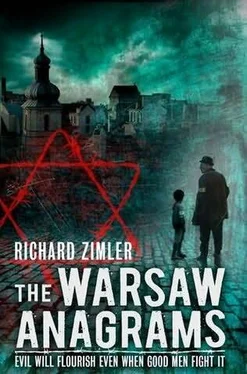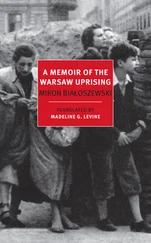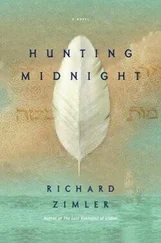‘Dr Cohen – time to get up,’ the woman told me in a sing-song voice.
I sat up, still half asleep. Behind my Scottish fairy godmother stood Izzy and Jaśmin, talking together. A big black dog was jumping between them and barking.
‘I’m Liza, Jaśmin’s sister,’ the woman told me sweetly. ‘Welcome to my home.’
Liza’s farm rose up a small slope from the grassy bank of the River Wieprz, across a thick wood from the village of Niecierz. An eighteenth-century stone house with two tiny upstairs bedrooms, it had originally been a second barn for a large manor house that lay a half-mile east and which wasn’t visible because of a low hill topped by a copse of spruce trees. Liza lived alone; her husband had died a few years earlier and her son and daughter, now adults, lived in Kraków.
The floors were hexagonal terracotta tiles – darkly lustrous with age – and the furniture was all heavy wood. The whitewash on the walls shone with grey-blue tonalities in the slanting afternoon light. The ceiling upstairs was so low that I could touch it by standing on my toes.
There was no electricity and no phone. We were in the Poland of our ancestors.
Izzy and I moved our things into the spare bedroom. It was freezing, but Liza soon got a coal fire going in the iron parlour stove, then opened her husband’s wardrobe and said, ‘Take whatever you want.’
We found thick woollen coats and scarves.

Liza was a potter. Her workshop was in the apple cellar, which was empty at this time of year but still smelled like cider. We drank good coffee for the first time in months and gorged on her while sitting around a stone table in her kitchen. I kept anxious thoughts away by watching the two sisters closely – Jaśmin so stylish and regal, and Liza in men’s trousers and a moth-eaten yellow sweater. I could see they adored each other in the way they laughed over nothing and gave each other complicitous, sideways glances. Over the next few months, they would often seem telepathic. In the end, I came to the conclusion that each one was living out the life the other might have had.
Liza told us that first afternoon that she would teach us how to use a potter’s wheel. We would be her assistants for as long as we lived with her. She assured us she was happy to have company.
When I pointed out that we were putting her life in danger, she shrugged as if the risk were of no importance.
Jaśmin told us she would stay the night, but would have to leave at dawn.
‘I have to get back to Warsaw. Tomorrow’s Friday, and if I’m not at the gallery on time, the owner will think it’s suspicious. I’ll come back on Saturday afternoon.’
That evening, over our early supper, I told the sisters about Irene and how she had heard Jaśmin speak about the ghetto, though I omitted that the girl had led me to Jesion and Lanik. I believed then that I held that information back because I didn’t dare speak of Adam’s murder in my fragile state. Now, I realize I was also protecting Irene; if Liza or Jaśmin were ever arrested, the less they could reveal about the girl the better.
The very next day, Izzy and I diagrammed our plans for making it to Lwów, and from there to Kiev, but Jaśmin soon made contact with an arms smuggler in the Warsaw Underground, and he told her that he had information that the Germans were building labour camps and military bases all across eastern Poland; in consequence, we ought not to risk our escape just yet. Her smuggler friend would let her know when it was safer to leave.
We stayed with Liza from March all the way to early July. After a few weeks, we were glad not to have to leave, though we knew we would set off as soon as Jaśmin gave us the go-ahead – if for no other reason than to stop putting Liza at risk.
Izzy and I stayed close to the farmhouse at all times; we dared not go near the nearest village for fear of being spotted and denounced. Still, sometimes at dawn, before anyone was up, we’d take her dog, Noc, for walks through the fields.
Noc had an extensive Polish vocabulary, and Izzy and I taught him Yiddish, as well.
Hak mir nisht ken tshaynik! Izzy would yell at the beautiful mongrel when he was barking too heartily at some rabbit or squirrel he’d chased into the underbrush. Amazingly, the dog would go all quiet and sit on his haunches, looking back and forth between us with his deep brown eyes full of remorse. Given his luxurious black coat, we joked that he was the reincarnation of a Jewish furrier and had been waiting all this time to learn his true language.
*
A few days after our arrival, Liza purchased insecticide at a local apothecary, and Izzy and I dusted ourselves with the white powder from top to bottom, turning ourselves into foul-smelling snowmen.
Izzy submerged in our bathtub first. When he was done, I stepped into the scalding water, sat down and closed my eyes. And entered paradise. I could not have been happier had I been five years old and embraced by my mother.
I hadn’t been aware of how tense and constrained my body had been – as if I’d been tangled in vines. Away with the lice went months of grime.
Still, I sobbed alone that night, hidden in Liza’s cellar.
Izzy and I wrote just a single letter to our children, fearing that our correspondence might cause trouble for Liza. I told Liesel I’d contact her again when we reached the Soviet Ukraine.
I’d get up every morning to watch the sunrise, grateful for the boundless pink and russet sky, for all that blessed light falling over the earth, for the warm breezes of spring and the butterflies fluttering over the flowers, for eagles and hawks and magpies and all that could fly beyond the control of the Nazis. Grateful, too, for a red fox that I saw late one afternoon, and who stopped to watch me as if I had descended to the earth from out of his sunrise.
The sound of my whispering with Izzy as we fell asleep was like protective netting. We covered ourselves with our voices every night.
He and I fired a few of our lopsided cups and vases in the kiln over those first weeks of refuge. One day, however, Liza decided she would teach me to centre a pot or die trying. She put her hands over mine and moved them through the luxurious wet clay, while that wheel of creation spun round and round between us like a dreidl that would never stop proclaiming the miracle of our escape. If she and I had been younger, maybe we’d have had a chance at another life. But one passes a gate without knowing it, and then there is no point in turning round and starting over. We both knew that and ended up laughing.
Still, it was good to be able to learn a new trade at my age.
Izzy and I were occasionally at each other’s throats over the most meaningless trifles, but we never forgot we were riding on the same raft at the centre of an angry sea, and that made all the difference. We were careful to give Liza enough time for herself and often stayed in our room – teaching Noc the subtleties of Yiddish grammar or tossing him his leather ball – when we would have preferred to be with her.
Imagine having to care for two elderly good-for-nothings. God, what we put that woman through!
It was a small life we had, but anything bigger would have put us at risk. Besides, we were exhausted. We hadn’t realized how depleted we were till we were off our island.
I slept twelve hours a night over those first weeks. And once my stomach adapted to wholesome food again, I made Liza’s dinner plates shine at every opportunity.
My hunger may have been obsessive at times, but Izzy’s nose hadn’t been dulled – like mine – by fifty years of pipe-smoking, and once his sensitive sniffer picked up the scent of good food again, it turned him into a slavering wolf; for a month or so he was unable to hold a conversation if there were even just a few grains of kasha or a smidgen of creamed sorrel still available. He would eye any crumbs Liza and I left over as if they had been stolen from him while he was reaching for the butter or pepper, and you could hear him counting the seconds he regarded as requisite – given our turn-of-the-century notions of etiquette – before he could make a headfirst dive for our plates.
Читать дальше













